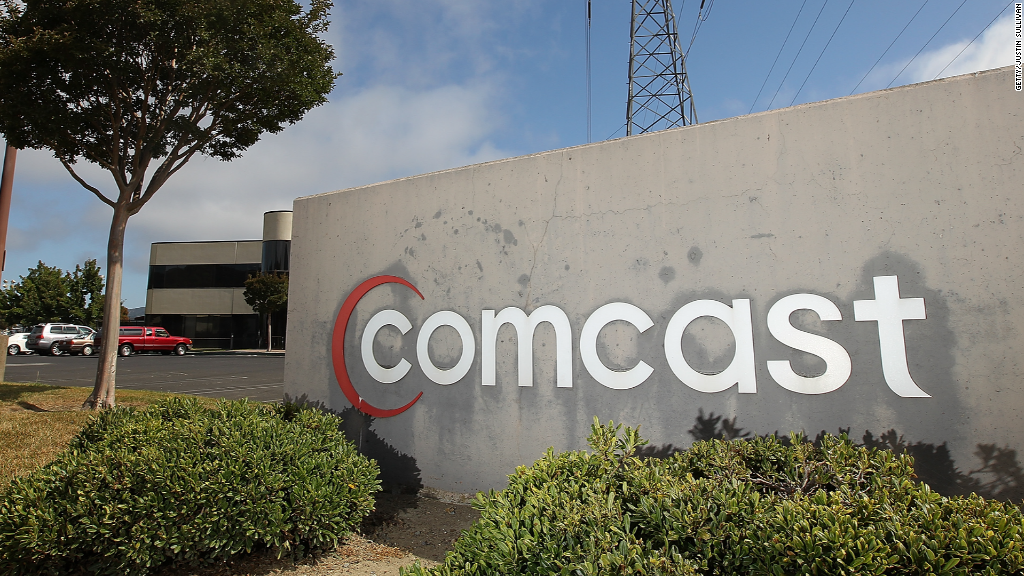
Data tiers and caps are commonplace on cell phones. But as our insatiable demand for online video grows, data caps are becoming increasingly prevalent on consumers' home Internet connections too.
In many regions across the country, Comcast has begun testing new tiers of data caps, which start at 300 GB a month and go up to unlimited, depending on the plan. Customers are charged $10 for every extra 50 GB they use over their cap.
Comcast also offers a "Flexible Data Plan" in certain regions, in which customers get a $5 credit if they use less than 5 GB of data per month. If they go over, they'll be charged $1 per GB.
Comcast this week added Little Rock, Arkansas; Shreveport, Louisiana; Chattanooga, Tennessee; and Galax, Virginia, among other cities, to its growing list of regions with broadband data caps.
The news was first reported by industry blog DSL Reports.
Comcast technically has a 250 GB cap for all customers, but it stopped enforcing it in 2012 to implement the new data cap trials.
The company notes that 300 GB is a lot of data, allowing customers to stream 117 HD movies, download 5,500 hours of music, make 86,000 minutes of FaceTime calls, upload 20,000 photos or send 585 million tweets.
Related: Comcast to give Atlanta fastest Internet in the country
Internet usage is exploding. At home, many people connect their smartphones to their Wi-Fi so they don't go over their 4G data limits imposed by their carriers. But we're not just connecting laptops and smartphones to our home Wi-Fi networks anymore. Nest thermostats, Rokus, Apple Watches, iPads, Xboxes and all the other smart stuff that we keep around the home are also using up bandwidth.
Still, the median Comcast customer uses just 40 GB of data per month, according to Charlie Douglas, a company spokesman. Just 8% of Comcast customers use more than 300 GB of data each month.
Broadband providers like Comcast have been upgrading their network infrastructure to support the growing traffic. That's an expensive endeavor, involving digging up roadways and buying pricey new equipment. Comcast spends billions of dollars each year upgrading its network, doubling its capacity at least every two years.
But Comcast says its tiers are not about managing network congestion. Instead, Comcast says the data usage plans are about "fairness," allowing customers to pay more or less depending on their usage.
Since the company has to pass its network improvement costs onto customers, it might as well be the biggest data hogs that foot the bulk of the bill, Comcast argues.
The broadband provider has another reason to incentivize its biggest traffic users to consume less bandwidth: The FCC measures broadband speeds each year and compares them to companies' advertised speeds. If data hogs are slowing down the network, Comcast may embarrassingly be unable to deliver on its promised speeds -- levels the company has exceeded for several years running.
Comcast (CMCSA) says it allows customers to track their data usage and receive alerts about when they're about to hit their cap. When it enforces data caps on new communities, it also forgives overage charges for three months.
Some of Comcast's competitors have also instituted data caps.
Cox and AT&T (T) U-Verse have similar caps, which both start at 150 GB. Smaller providers MediaCom and Suddenlink also have caps.
But Comcast's largest competitors largely don't have caps. Time Warner Cable (TWC) has experimented with optional data caps, but they have not gained significant traction with customers. Charter (CHFN) said it would not impose any limits on customers' broadband usage for three years if its proposed deal for Time Warner Cable is approved by regulators.
Cablevision (CVC), Bright House and Verizon (VZ) FiOS also don't have data caps, and have pledged not to impose them in the future.
Only about 12% of Comcast customers are subject to the data caps, according to Craig Moffett, analyst at Moffett Nathanson. Comcast says it has no current plans to add more cities to its data cap trials.

